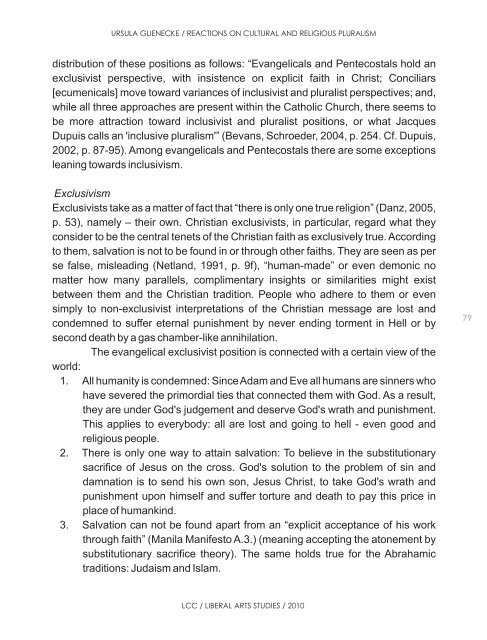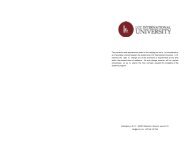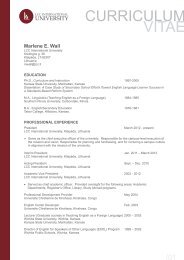lcc liberal arts studies / 2010 volume iii - LCC International University
lcc liberal arts studies / 2010 volume iii - LCC International University
lcc liberal arts studies / 2010 volume iii - LCC International University
Create successful ePaper yourself
Turn your PDF publications into a flip-book with our unique Google optimized e-Paper software.
URSULA GLIENECKE / REACTIONS ON CULTURAL AND RELIGIOUS PLURALISM<br />
distribution of these positions as follows: “Evangelicals and Pentecostals hold an<br />
exclusivist perspective, with insistence on explicit faith in Christ; Conciliars<br />
[ecumenicals] move toward variances of inclusivist and pluralist perspectives; and,<br />
while all three approaches are present within the Catholic Church, there seems to<br />
be more attraction toward inclusivist and pluralist positions, or what Jacques<br />
Dupuis calls an 'inclusive pluralism'” (Bevans, Schroeder, 2004, p. 254. Cf. Dupuis,<br />
2002, p. 87-95). Among evangelicals and Pentecostals there are some exceptions<br />
leaning towards inclusivism.<br />
Exclusivism<br />
Exclusivists take as a matter of fact that “there is only one true religion” (Danz, 2005,<br />
p. 53), namely – their own. Christian exclusivists, in particular, regard what they<br />
consider to be the central tenets of the Christian faith as exclusively true. According<br />
to them, salvation is not to be found in or through other faiths. They are seen as per<br />
se false, misleading (Netland, 1991, p. 9f), “human-made” or even demonic no<br />
matter how many parallels, complimentary insights or similarities might exist<br />
between them and the Christian tradition. People who adhere to them or even<br />
simply to non-exclusivist interpretations of the Christian message are lost and<br />
condemned to suffer eternal punishment by never ending torment in Hell or by<br />
second death by a gas chamber-like annihilation.<br />
The evangelical exclusivist position is connected with a certain view of the<br />
world:<br />
1. All humanity is condemned: Since Adam and Eve all humans are sinners who<br />
have severed the primordial ties that connected them with God. As a result,<br />
they are under God's judgement and deserve God's wrath and punishment.<br />
This applies to everybody: all are lost and going to hell - even good and<br />
religious people.<br />
2. There is only one way to attain salvation: To believe in the substitutionary<br />
sacrifice of Jesus on the cross. God's solution to the problem of sin and<br />
damnation is to send his own son, Jesus Christ, to take God's wrath and<br />
punishment upon himself and suffer torture and death to pay this price in<br />
place of humankind.<br />
3. Salvation can not be found apart from an “explicit acceptance of his work<br />
through faith” (Manila Manifesto A.3.) (meaning accepting the atonement by<br />
substitutionary sacrifice theory). The same holds true for the Abrahamic<br />
traditions: Judaism and Islam.<br />
<strong>LCC</strong> / LIBERAL ARTS STUDIES / <strong>2010</strong><br />
79






